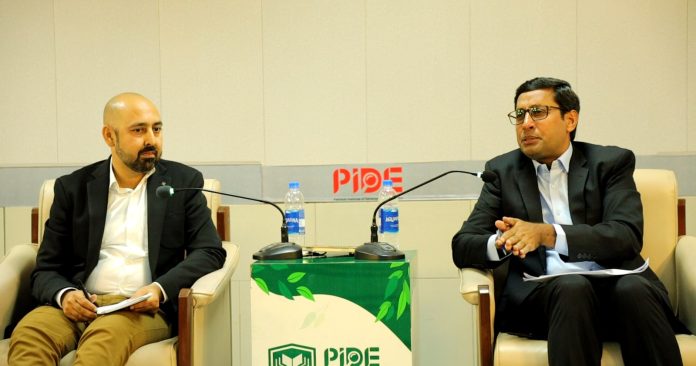- Advertisement -
ISLAMABAD, Oct 29 (APP):The Pakistan Institute of Development Economics (PIDE), in collaboration with the Planning Commission’s RASTA initiative, Wednesday organized a seminar titled “Pakistan’s Groundwater Crisis: Policy Lessons and a Framework for Sustainable Resource Use”, unveiling a comprehensive roadmap to address the country’s mounting groundwater challenges.
The seminar featured Nazam Maqbool, Social Scientist and Project Manager at RASTA, as the keynote speaker, while Dr Muhammad Faisal Ali, Research Fellow at PIDE, moderated the session, a news release said.
Opening the discussion, Dr Faisal highlighted Pakistan’s alarming transition from a water-stressed to a water-scarce nation, noting that per-capita water availability had declined from over 5,000 cubic meters in 1947 to less than 1,000 cubic meters at present.
He stressed that while surface water scarcity and climate change dominate public discourse, the depletion of groundwater – the country’s silent lifeline – remains dangerously neglected.
In his presentation, Nazam Maqbool said Pakistan, one of the most arid countries in the world, receives an average annual rainfall of only 494 millimeters.
The Indus River system, he added, contributes about 96 percent of the country’s total water supply, with nearly 78 percent originating outside Pakistan’s borders. Pakistan, he said, possesses the world’s fourth-largest aquifer and ranks fourth globally in groundwater use, extracting around 65 cubic kilometers annually against a recharge rate of only 55 cubic kilometers.
He revealed that around 70 percent of Pakistan’s urban population and over 80 percent of its rural population depend on unsafe drinking water sources, with about 60 million people exposed to arsenic contamination.
Over 4.5 million hectares of land have been affected by waterlogging and salinity, while cities such as Lahore are losing up to three feet of groundwater annually.
Nazam Maqbool identified the absence of a binding national groundwater law, overlapping institutional responsibilities, and weak inter-provincial coordination as major governance challenges.
Electricity subsidies, he noted, have encouraged over-pumping, while tariff recovery covers only 24 percent of operational costs. Punjab’s average water tariff of US$0.12 per cubic meter, he said, remains far below the global average of US$2.36.
To tackle these issues, Nazam Maqbool proposed a seven-pillar framework for sustainable groundwater management. The plan includes the establishment of a National Groundwater Council, provincial licensing and metering reforms, comprehensive aquifer mapping, real-time data systems, and integrated water management strategies.
He further called for shifting from water-intensive crops like sugarcane and rice to less water-demanding, high-yield alternatives such as pulses and oilseeds, alongside promoting drip and sprinkler irrigation.
Citing global practices, he said Israel now meets 25 percent of its water demand through reuse of 90 percent of treated wastewater, while several U.S. cities have successfully halved urban water consumption through efficiency reforms.
Concluding the session, Dr Faisal Ali emphasized that Pakistan’s groundwater challenge could not be solved in isolation but required systemic reforms in governance, technology, and behavioral change.
He said groundwater governance must be treated not merely as an environmental concern but as a pillar of national stability and security.

